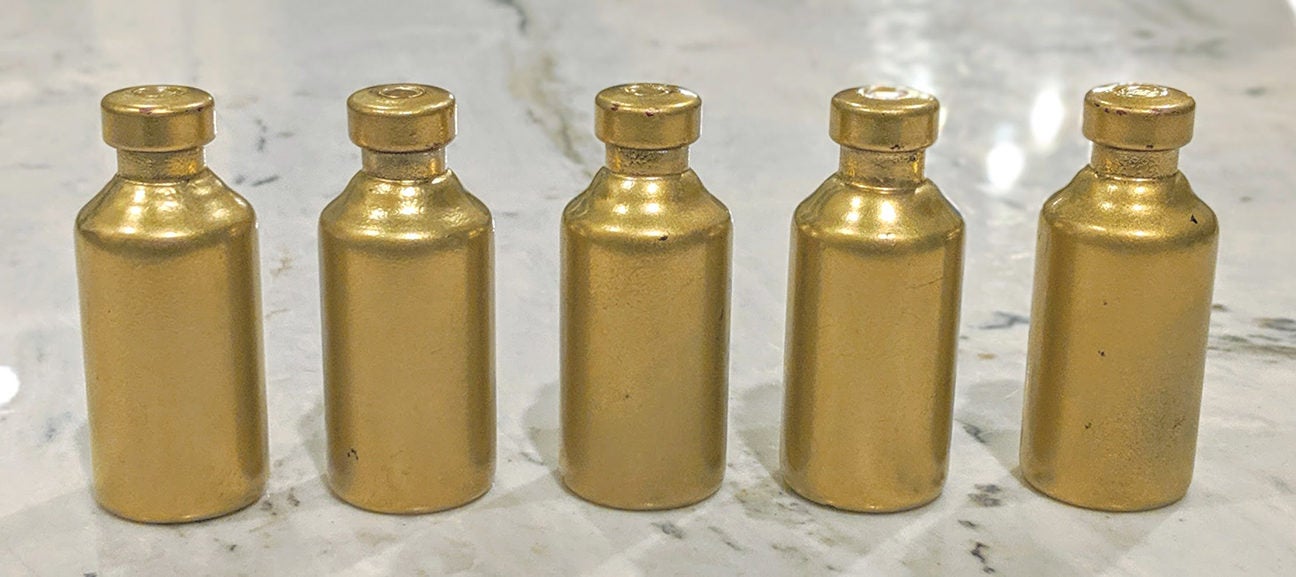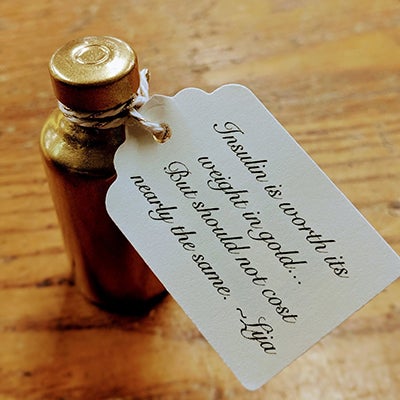Insulin Prices: Gold Vials and Canadian Pharmacies

As outrage over insulin prices continues across the country, diabetes advocates are inventing ever new ways to help their peers in need.
A D-Mom in Minnesota has launched what’s known as The Gold Vial Project, which involves making artwork from empty insulin bottles and sending them to politicians who promise to push for lower prices. Lawmakers who are on board are encouraged to keep them on hand and spread the word.
Meanwhile in Kentucky, a longtime type 1 was inspired to launch a venture connecting people with Canadian pharmacies in order to purchase their life-sustaining medication at a much more affordable price than is found in America.
These efforts are born of desperation.
Trading and borrowing insulin
In a new study published in December 2019, over half of the participants confirmed that they've turned to the underground black market to access the medications and supplies they need. This includes donating, trading, borrowing, and purchasing meds and supplies directly from other individuals, mostly online.
Nearly 50 percent of the 159 people surveyed said they couldn’t afford necessities for their family as a result of diabetes costs, and the financial distress they face forces some to go without food, shelter, clothing, and transportation.
More than 50 percent said they had donated medications or supplies themselves, while 35 percent received donations, 24 percent traded medications, 22 percent borrowed items and 15 percent purchased items. These exchanges took place among family, friends, co-workers, online acquaintances, and strangers.
The researchers reported that people who flagged financial stress due to their diabetes needs were six times more likely to engage in underground exchanges and three times more likely to seek donations.
“There is an urgent need to improve access to medications that are essential for life... Our study points to a failure in the U.S. healthcare system since such underground exchanges may not be necessary if medications and supplies were accessible," the researchers concluded.
“People don’t want to be fraudulent or break the law,” lead researcher Dr. Michelle Litchman, added. “People want to be well. We need to recognize this is why they started this anyway.”
The grassroots #insulin4all advocacy and #MakeInsulinAffordable campaign from the American Diabetes Association are beginning to have an impact. For example, Congress has introduced multiple bills focused on insulin pricing, while states are adopting emergency access laws and insulin copay cap laws. But change is clearly not coming quickly enough for those in desperate need around the country.
So individuals are getting inventive with new ways to address this crisis. The Gold Vial Project and Sensible Insulin are two great examples.
Gold insulin vials as 'a constant reminder'
Minnesota D-Mom Lija Greenseid and her 13-year-old daughter with T1D are the forces behind this new initiative known as The Gold Vial Project.
A policy consultant, Greenseid has been active in the Diabetes Online Community for the past 6 years since her daughter's diagnosis. She helped start the popular Project Blue November online advocacy group a few years ago.
Recently she's been a strong voice of #insulin4all advocacy both nationally and on the home front in Minnesota, one state's that been a leader on the insulin pricing discussion. That's due in large part to another Minnesota D-Mom, Nicole Smith-Holt, who lost her 26-year-old son Alec as a result of rationing insulin.

It started when Greenseid was meeting with the Minnesota governor and lieutenant governor, and she had her daughter paint an empty insulin vial gold as a trinket to give to them. The local newspaper snapped a photo of her handing that off and put it on the front page. Afterward, the governor displayed that gold vial in hand during a press conference as he spoke about the Alec Smith Emergency Insulin Act legislation being considered in that state.
"Insulin is worth its weight in gold, but shouldn't cost nearly the same to afford it," she says.
To date, at least 33 politicians across 9 states have received a gold vial in some form. That includes 10 women and 23 men, 20 Democrats and 13 Republicans, a truly bipartisan advocacy effort:
- 4 presidential candidates (Warren, Yang, Biden, and Bloomberg)
- 7 U.S. Representatives
- 5 U.S. Senators (including Warren, also a presidential candidate)
- 1 governor
- 1 state attorney general
- 11 state Representatives or candidates
- 5 state Senators
Greenseid heavily promoted her initiative during National Diabetes Awareness Month in November, encouraging other advocates to decorate their own vials in gold and share those online.
She sees the vials as way to connect with people and spread the message about insulin unaffordability with those in (or seeking) political office. They serve as a tangible token to make the issue visible.
"This can be a constant reminder that they keep with them, reminding them of what they're fighting for," she says.
"This is an idea for people to use," Greenseid says. "My goal is for this to be another way for people to get involved and use their own voices, their own creativity, to make a difference."
Sensible Insulin: Get it from Canada!
Just outside Louisville, Kentucky, longtime type 1 Kevin Trager found himself becoming more and more angry over skyrocketing insulin prices and the apparent lack of action from those in power.
Diagnosed at age 12 in 2001, Trager says he never envisioned being a diabetes advocate. A journalist by trade, he worked in TV broadcasting in Kentucky and around the country until a few years ago when he decided to go back to school to earn a master's degree in social work.
In early 2019, when he began noticing increasing media coverage on the insulin pricing issue, Trager joined his local #insulin4all chapter in Kentucky, and began meeting others passionate about the issue.
Medical tourism also began catching his eye. He saw people in the Diabetes Community traveling to Canada and Mexico for insulin, and the journalist in him prompted his own research. Trager traveled to Windsor, Ontario, to experience Canadian insulin buying for himself. There, a vial of fast-acting insulin costs just about $30 retail price compared to about $300 here in the states.
This sparked an idea: He decided to set up a service called Sensible Insulin through which he can provide people information about finding less expensive insulin via Canadian pharmacies, whether they're buying in-person or having it shipped from that country into the United States.
As of mid-January, he's been in contact with roughly 90 people, mostly outside of Kentucky. Trager talks to them directly to learn their stories and affordability struggles, and then connects them with a Windsor pharmacy to go about buying insulin if they choose to move ahead.
He's also planning to work with state-based endocrinologists' offices and a Louisville-area school system to share Sensible Insulin pamphlets, in the hopes of connecting with more people in need.
"As a type 1 myself, I was tired of seeing people suffer, and the people who have the power to do something about it are not solving this. I was kind of pissed off," Trager says. "It breaks my heart that this is the United States of America in 2020 and people are dying because they can't afford insulin. I chose to do something to help them now."
Yes, he knows that technically it may be illegal to import prescription drugs, but he also knows that an FDA exemption allows personal importation of 90 days of worth of insulin for personal use. A border patrol agent in Windsor asked him about that, in fact.
He doesn't earn any money from this effort; it's strictly volunteer. He is considering whether his efforts could be morphed into a bigger advocacy effort or nonprofit organization to help more people — especially if he's able to expand his roster of trusted pharmacies in Canada.
Trager does worry that more media attention and PWDs traveling abroad to buy insulin could result in policy change on enforcement at the border. But if that happens, he says our Diabetes Community will find other ways to help each other.

Comments
Mike, I hope you are doing well. Take care and stay warm this weekend.